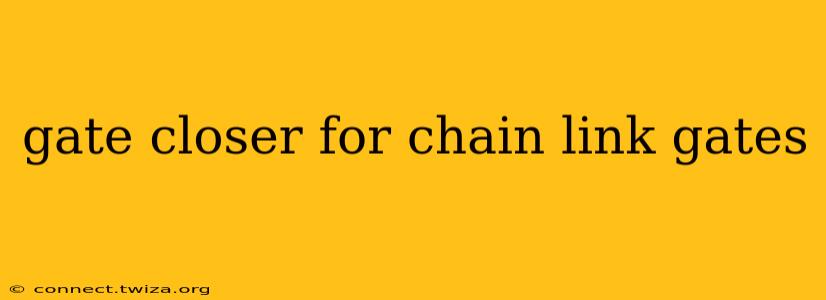Chain link gates, while practical and affordable, can be a nuisance if left to swing freely in the wind or bang shut unexpectedly. A gate closer provides a simple solution, ensuring your gate closes smoothly and securely, enhancing both safety and security. This guide will explore various types of gate closers suitable for chain link gates, installation tips, and factors to consider when making your selection.
What are the Different Types of Gate Closers for Chain Link Gates?
Several types of gate closers can effectively manage your chain link gate. The best choice depends on gate weight, desired closing speed, and your budget.
Spring Closers:
These are the most common and affordable option. Spring closers use a spring mechanism to pull the gate closed. They offer adjustable closing speeds, allowing you to fine-tune the force to suit your gate's weight and wind conditions. They are typically easy to install and maintain.
Hydraulic Closers:
These closers utilize hydraulic fluid to control the closing speed. They provide a smoother, more controlled closing action compared to spring closers, particularly beneficial for heavier gates. Hydraulic closers often offer adjustable closing speeds and hold-open features, preventing the gate from slamming shut. They are generally more durable and long-lasting than spring closers but come with a higher price tag.
Electric Closers:
While less common for residential chain link gates, electric closers are a viable option for larger, heavier gates or high-security applications. These closers use an electric motor to control the gate's closing, offering features like remote control and programmable closing speeds. They are typically more expensive to purchase and install and require a power source.
How Do I Choose the Right Gate Closer for My Chain Link Gate?
Selecting the correct gate closer involves several key considerations:
Gate Weight:
This is crucial. The closer's capacity must exceed your gate's weight. Manufacturers specify the maximum gate weight each closer can handle. Underestimating this can lead to premature closer failure.
Gate Width and Height:
Larger gates require more powerful closers to overcome wind resistance and ensure reliable closing.
Environmental Conditions:
Wind exposure significantly impacts gate closer performance. In windy areas, a more robust closer with adjustable closing speed is essential.
Budget:
Spring closers are the most economical, followed by hydraulic, and then electric closers. Weigh your budget against the features and durability offered by each type.
How Difficult is it to Install a Gate Closer on a Chain Link Gate?
Installing a gate closer varies depending on the type and your DIY skills. Spring closers are generally the easiest to install, often involving attaching the closer to the gate post and the gate itself using provided hardware. Hydraulic and electric closers may require more technical expertise and possibly professional installation. Always follow the manufacturer's instructions carefully.
What are Some Tips for Maintaining My Gate Closer?
Regular maintenance prolongs the life of your gate closer. This includes:
- Lubrication: Periodically lubricate moving parts according to the manufacturer's recommendations.
- Inspection: Regularly inspect for any signs of damage or wear.
- Adjustments: Adjust the closing speed as needed to compensate for changes in weather conditions or gate wear.
How Much Does a Gate Closer for a Chain Link Gate Cost?
The cost varies widely depending on the type, brand, and features. Spring closers can be relatively inexpensive, while hydraulic and electric closers can be significantly more costly. Expect to pay anywhere from a few tens to several hundred dollars.
This comprehensive guide should equip you with the knowledge to choose and install the right gate closer for your chain link gate, ensuring smooth operation and increased security for years to come. Remember to always consult the manufacturer's instructions for specific installation and maintenance procedures.
